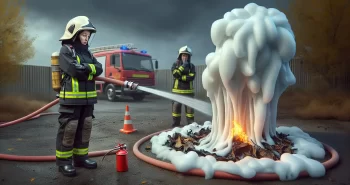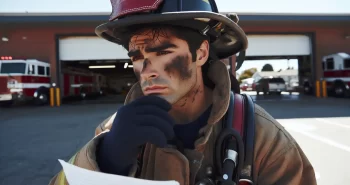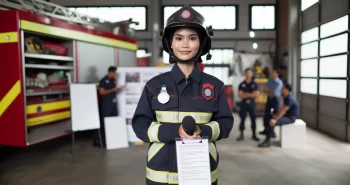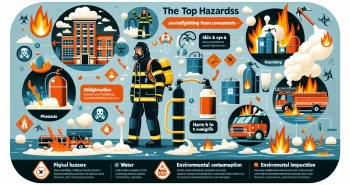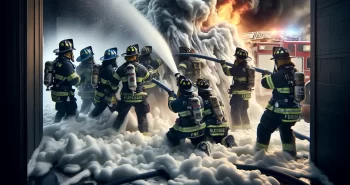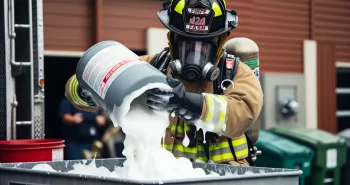Firefighting Career Risks and Legal Claims
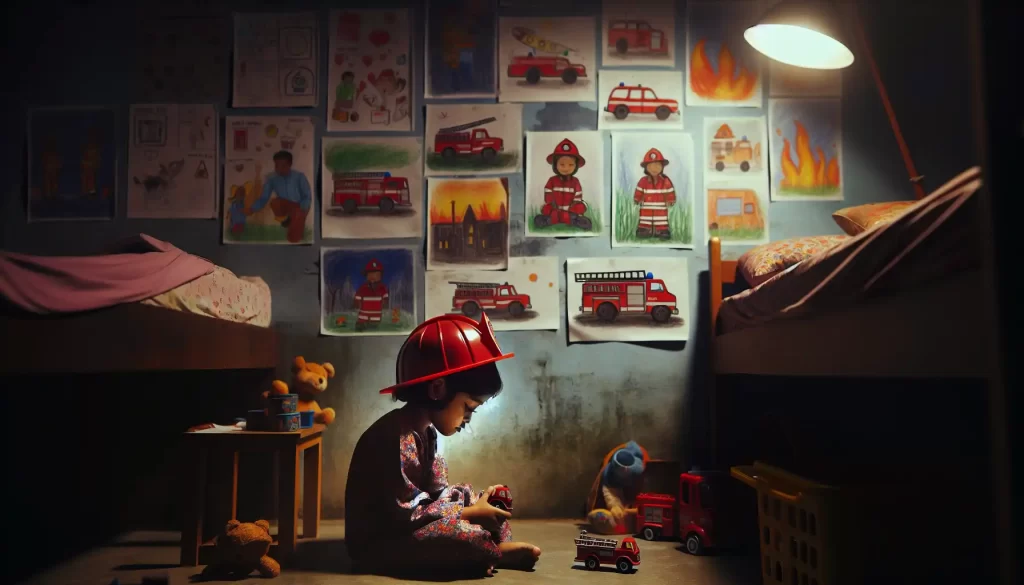
Is firefighting a good career? If you’ve worked with firefighting foam or faced hazardous chemicals on the job, you may be entitled to compensation. This page explores the risks firefighters face and how you can take legal action to protect your health and claim damages. Learn about your rights and eligibility for filing a claim and Get Legal Help.
Table of Contents:
![]()
![]()
What Does a Firefighter Do?
Jumping into a firefighter’s boots isn’t for the faint-hearted. It’s about putting courage, muscle, and a bit of smarts to work every single day. So, let’s break down what keeps these everyday heroes busy and what fancy hats they might wear if they decide to specialize.
Daily Responsibilities and Duties
As a firefighter, my day kicks off with a blend of tasks that demand quick decisions, physical strength, and team spirit. Here’s the lowdown:
- When the alarm rings, I’m out the door heading to fires or emergencies, working to snuff out flames before they wreak havoc.
- Rescue’s my middle name, whether it’s folks or even critters stuck in dangerous spots.
- Handing out medical help, like band-aiding or busting out CPR, whenever someone’s hurt or in a pinch.
- Keeping gear in tip-top shape, making sure everything works when it has to, because nobody wants a hose that doesn’t hose.
Beyond the basics, firefighters might also dive into specialty areas, mastering skills unique to certain situations. Let’s see who these specialists are and what they bring to the firehouse.
Types of Firefighters and Specializations
Firefighters come in flavors, each bringing their twist to saving the day and meeting what their community needs. Here are some familiar faces in fire services:
- Airport Firefighters: They’ve got the runway covered, dealing with aircraft whoopsies like crashes or stalls. Their expertise in handling airborne fires is second to none.
- Wildland Firefighters: These guys battle blazes where the pavement ends—in forests and fields, tackling flames under the sky with grit and those cool tactics you’d see in hero flicks.
- Hazardous Materials (Hazmat) Technicians: Ever heard of chemical spills or toxic clouds? These folks have. They suit up to sort out the nastiest substance leaks and keep everyone safe.
- Fire Investigators: The detectives in our mix, they figure out what lit things up and why. Breaking down scenes, piecing clues, and ensuring we don’t repeat mistakes are their jam.
Having an idea of what firefighters do daily and the different paths they can take underlines the whirlwind that is their work life. From jumping into fire trucks, rescuing lives, to sifting through ashes for answers, firefighters are the backbone keeping us safe and sound.
Pros of Becoming a Firefighter
Taking a hard look at firefighting as a career choice unearths some pretty attractive perks for anyone toying with the idea of joining this noble trade. Beyond rescuing cats from trees, there’s a lot on offer from job security to climbing the career ladder.
Job Stability and Demand
If you’re eyeing a career in firefighting, job security is as solid as it gets. According to the Bureau of Labor Statistics (BLS), there’s a 5% growth in the fire service industry expected by 2024. That’s not just numbers, that’s a promising future for current and would-be firefighters, meaning a steady call for brave souls ready to tackle fires and other emergencies.
Strong Sense of Purpose and Community Impact
Forget about the paycheck for a moment—being a firefighter gives you a whole new purpose in life. You’re right there on the frontlines, making a real difference by keeping people and their homes safe. That real, heart-thumping satisfaction you get from helping others isn’t just a bonus. It’s the kind of pride and fulfillment that makes every call worth it.
Competitive Salary and Benefits
Now, back to the bucks. Jump into firefighting, and you’ll find it’s not just about risk—there’s a juicy paycheck and benefits waiting. If you’re saving lives in Columbus, Ohio, you’re looking at an average base salary of $45,463 a year, stretching from $12,000 to $195,000, depending on your path and role. This wide range shows there’s more than enough room for financial growth and stability for you and your family.
Opportunities for Career Growth
As you blaze through your firefighting career, plentiful pathways branch off, leading to growth and advancement. With some experience and the right qualifications under your belt, you could steer your career into leadership roles, say, fire captain, lieutenant, or training officer. These positions need specific skills and years on the job, guiding you up the ranks in fire and emergency services.
Tackling further studies in fields like fire science, public administration, or emergency management can seriously boost your chances of landing top jobs—maybe even fire chief or emergency manager roles. Digging into education isn’t just about sharpening your skills; it opens up doors to bigger gigs with chunkier responsibilities and stronger community impact.
As you weigh the pros and cons of stepping into firefighting, remember the sense of purpose, packed paychecks, and the growth rides waiting for you in this privileged field. Whether it’s the reliability of the job, the difference you’ll make, or the shot at climbing higher, firefighting can offer a rewarding career path if you’re ready to serve and safeguard your community.
Cons of a Firefighting Career
Being a firefighter is a lot more than just sliding down poles and waving at kids from a big red truck. It’s a job that demands guts, grit, and more than a little sweat equity. Before you take the plunge into this line of work, you’ll want to know exactly what you’re signing up for—the bumps, the bruises, and all the stuff you don’t see on TV. Let’s break it down, no sugarcoating here.
Physical and Mental Challenges
Think you’ve got what it takes to tackle a blaze? You’ll need to be in superhero shape for starters. Firefighting is a beast when it comes to physical demands. We’re talking about lugging around heavy gear, rushing into burning buildings, and sometimes pushing your body—perhaps a bit too far. It’s not just your muscles that take a hit; your mental toughness is tested too.
When you’re the one keeping a cool head while everything’s literally going up in flames, it’s easy for things to weigh heavy on your heart. Seeing traumatic stuff day in, day out can leave an impact—this gig isn’t for the faint-hearted. Firefighters often battle PTSD because those distressing scenes tend to linger long after the fires are out.
High-Risk Work Environment
You can bet your bottom dollar that firefighting isn’t a desk job. Walking into burning structures, dealing with dangerous chemicals, and facing the unknown is par for the course. In short, every shift is a roll of the dice.
Firefighters may face exposure to hazardous substances like firefighting foam, which could qualify them for compensation. These aren’t just a passing annoyance—they’re killers like cancer waiting to pounce. Respiratory issues, bad hearing, skin problems, and tweaking your back? Those are just day-to-day hazards in firefighting life.
Long Hours and Shift Work
Forget about a nine to five gig. Firefighters live by their own clock, working when everyone else is sleeping or celebrating. With emergencies having a habit of popping up at any time, a firefighter’s schedule can turn your personal life upside down. Long hours, sleepless nights, and holidays spent on call? Welcome to firefighting.
This crazy schedule isn’t easy when you’re trying to juggle family time or any semblance of a social life. It messes with your sleep and tests your patience, and burnout is always lurking in the shadows.
So, if you’re eyeing a firefighting badge, keep your eyes wide open to the realities. Know the risks, know your limits, and prepare yourself. For a look into health challenges like cancer and what legal protections might have your back, check out the page on firefighting foam cancer and how it ties into the broader story.
Qualifications and Training Required
If you’re thinking about joining the ranks of firefighters, you gotta know what’s needed to step into them boots. Let’s chat about everything from the right schooling to gettin’ yourself in top physical and mental shape. Here’s the scoop on what it takes to become a firefighter.
Education and Certifications Needed
First off, don’t just dive in without the proper schooling. We’re talkin’ about a strong foundation in fire science or something close. Lots of fire departments now want you to have at least an associate’s degree. If you’re gunning for a higher-up position, a bachelor’s degree might just be your ticket.
Beyond just the textbooks, you’ll need to collect a few certifications that prove you can handle things like emergency medical situations, dealing with nasty hazardous materials, or getting folks out of sticky spots. These certs can be different depending on where you are, but you can bet you’ll need ’em to show you’re ready for whatever the job throws at you.
Physical and Mental Fitness Requirements
Now, let’s talk muscles and mindset. You gotta be in great shape because fighting fires isn’t some walk in the park. You’ll be toting heavy gear, climbing ladders like Spider-Man, and sometimes pulling people from some dicey spots.
And it’s not just about being a gym rat—your noodle needs to be in top form too. The job can mess with your head, so staying cool when things heat up (literally) is crucial. You’ll need to think fast and keep your cool, all while working smoothly with your crew. People skills and handling stress like a champ will get you far.
Fire Academy and Ongoing Training
Before you start saving kittens from trees, there’s the fire academy where you’ll learn the ropes. This is where you’ll pick up key skills like how to put out fires, what to do during a rescue, and how to give first aid. This training lays down the groundwork for your firefighting career, so pay attention!
But that’s not all—learning doesn’t stop when you leave the academy. As gadgets and methods for fighting fires change, you gotta keep updating your skills. Through continuing ed and specialized training, you’ll get to know all the new gear and techniques and keep up with the best ways to handle things. By always aiming to learn and improve, you’re setting yourself up to tackle whatever new challenges may come.
So, if you’re serious about this firefighting biz, understanding what you need in terms of qualies and training is key. You get the right education, nab those certs, stay fit, and you’re on your way to a career that not only has you fighting fires but making a solid difference in your community.
Job Outlook and Career Advancement
Hey, let’s dive into the world of firefighting, shall we? There’s some encouraging news for those thinking about donning the big red hat. The Bureau of Labor Statistics tells us there’s going to be a 5% rise in the field by 2024. That means more boots on the ground and more chances to climb the ladder and maybe even run the show one day!
Demand for Firefighters in the USA
Everyone needs a hero and in the USA, we’re seeing more and more folks needing firefighters, keeping them front and center in the community, like they’re Batman, without the cape. With cities booming and the chaos of everyday emergencies, we’re counting on skilled firefighters to keep the calm. So, it’s pretty safe to say—they’ll always have a job. Job stability, ding ding!
How to Advance in the Firefighting Field
Thinking of leveling up in the fire world? Well, the sky’s the limit my friend! You might start out fighting fires, but with some dedication and maybe a sprinkle of ambition, you could be eyeing roles like district manager, fire captain, or even those fancy executive officer positions. Each fancy title comes with its own special bag of skills, experience, and those never-ever-get-boring trainings.
Hitting the books might also be your secret weapon. Imagine snagging a degree in fire science or public administration. Trust me, it might sound like a snooze-fest now, but it lets you chisel your way to those higher echelons—maybe even fire chief or the guy making all the big calls during emergencies. Education opens doors, like really big flashy ones!
Firefighters keen on climbing the hierarchy should never stop learning. Classes and training sessions are key, and some departments like theirs employees to have, at least, an associate degree in fire science hanging on their wall. Want to stand out from the crowd? A bachelor’s degree is the cherry on top, giving you a leg up in securing managerial roles.
So there you have it! More education and training not only make you grander in the professional realm but also boost those dollars in your bank account and let you do a little more good in your hood. Pushing forward in your career with that firefighter tenacity can put you in the driver’s seat, letting you guide your team, and create a safer place for everyone to live their best lives.
Is Firefighting the Right Career for You?
Deciding if fighting fires is your jam isn’t as cut and dry as some might think. Before you grab the hose and helmet, you should know what makes a great firefighter tick and ask yourself a few soul-searching questions about life in the flame-fighting lane.
Key Traits of a Successful Firefighter
Wanna be a firefighter? Here’s the scoop on what’ll keep you thriving in the heat of the moment:
- Being in Shape: You ain’t running a marathon, but the job means heavy lifting, climbing ladders, and nonstop hustle. One word: stamina.
- Talking it Out: Whether it’s over a radio or while yanking someone out of a burning building, clear talk saves lives. You’ve got to say what you mean and mean what you say, pronto.
- Rolling with the Punches: Fires have a mind of their own. Got to think fast and keep cool under pressure. Flexibility isn’t just for yogis.
- Team Vibes: Forget lone wolves. This gig is all about teamwork. If you’re not high-fiving after a great save, maybe rethink.
- Figuring Stuff Out: Troubleshooting on the fly? Yeah, all the time. Quick wins come from sizing up situations efficiently and deciding smartly.
Questions to Ask Before Pursuing This Career
If the thought of wearing fireproof gear excites you, pause for a sec to consider:
- Do I Have the Grit for This? – Long hours, grueling physical tasks, mental battles. You got the stamina and nerve?
- Am I Good with Being One of the Crew? – Firefighting isn’t a solo act. You okay jumping into a team situation, under some serious stress?
- Can I Handle Crappy Hours? – Midnight calls. Soggy Thanksgiving dinners. If you’re chill bending time’s rules, step right up.
- Am I Ready to Keep Learning? – You’ll need to hit the books from time to time, keep that skillset sharp. On board with ongoing training?
- Do I Want to Make a Real Difference? – It’s not just about the thrill of fighting fires. It’s serving, protecting, and changing lives. Does that light your fire?
Ponder these thoughtfully, ‘cause once you’re in, you’re in. Consider everything—the grit, the guts, and the glory. If the commitment calls to you, be sure to weigh the risks and rewards. And if your firefighting journey leads to exposure to harmful stuff like AFFF foam, check out Legal Claim Assistant to see if you can get some bucks for battling the big burns.
Legal Risks and Compensation for Firefighters
Keeping firefighters safe and healthy’s a big deal, especially with all the nasty chemicals they bump into on the job. It’s really about knowing the risks, like getting cancer, and what the law’s got set up to shield these brave souls.
Legal Risks and Compensation for Firefighters
Firefighters don’t clock in for a regular day – they’re up against stuff like benzene, asbestos, and diesel smoke that can really mess with their health. These toxic pals up the chance of rough cancers, like mesothelioma, leukemia, and things that hit the brain. It’s not just about breathing these things in; the job’s tough physically too, all adding to more health trouble down the line. For the scoop on firefighting foam and its effects, check out our piece on AFFF health effects.
How Legal Claim Assistant Has Your Back for Compensation
If a firefighter ends up sick from what they’re exposed to at work, chasing after some compensation is kinda necessary. Legal Claim Assistant’s there to back firefighters, guiding them through the tricky world of getting what’s fair if their job’s left them hurting.
They know the ropes when it comes to using the legal system – whether it’s through agreements, courtroom drama, or other paths. Their know-how, especially with firefighting foam cases, means affected firefighters get the right kind of help and resources to score just compensation. If you think your health’s been hit by firefighting foam, it might be time to chat with a firefighting foam lawyer.
Knowing the ins and outs of firefighting health dangers and legal safety nets means firefighters can make smart moves to protect themselves and nab the compensation owed to them. Stay sharp on what’s hazardous at work, and arm yourself with all the intel needed to keep your health and rights protected if you’re out there fighting fires.



